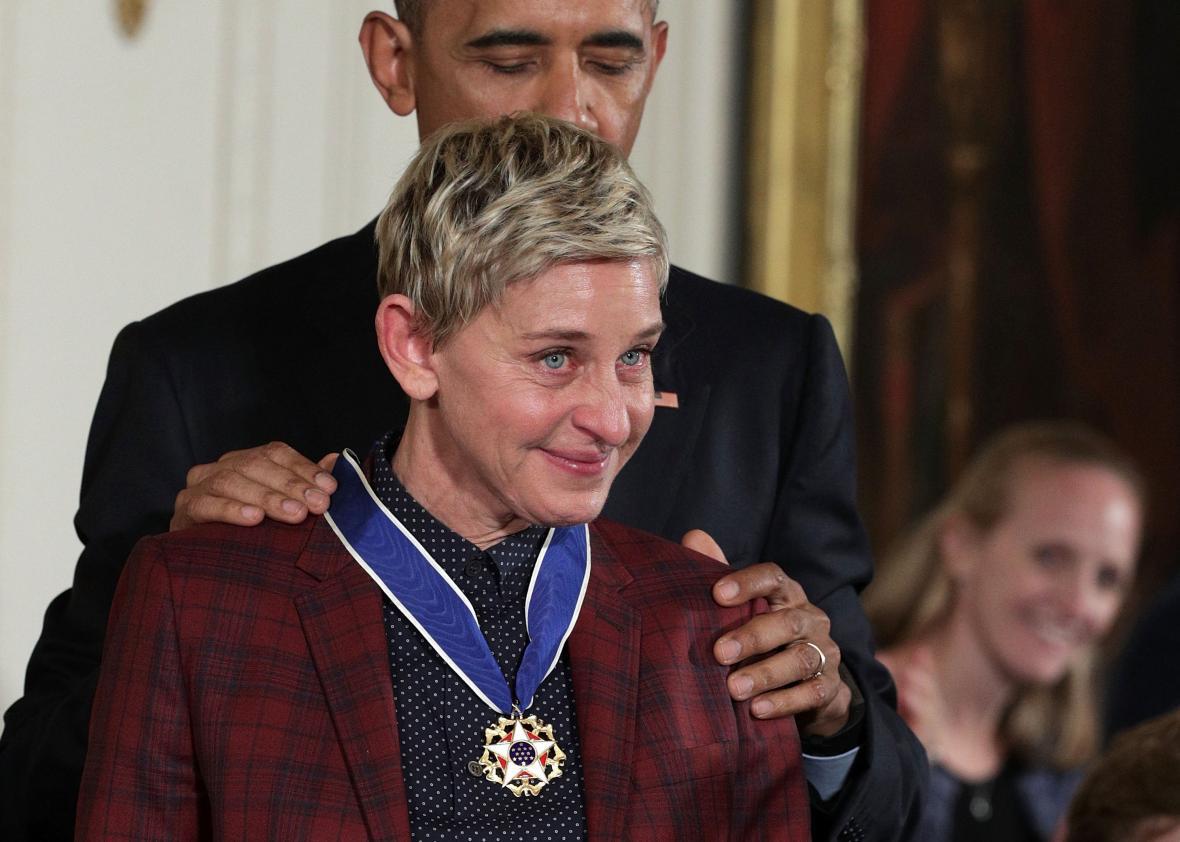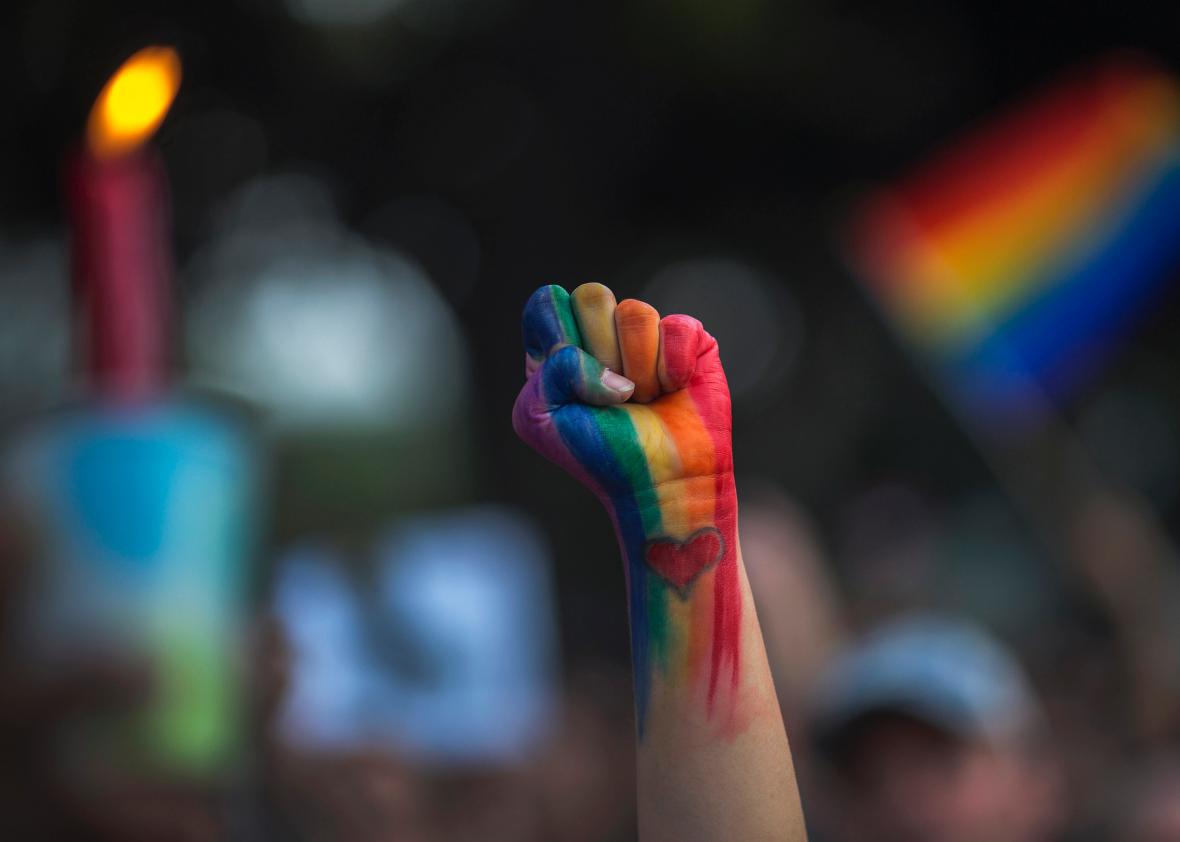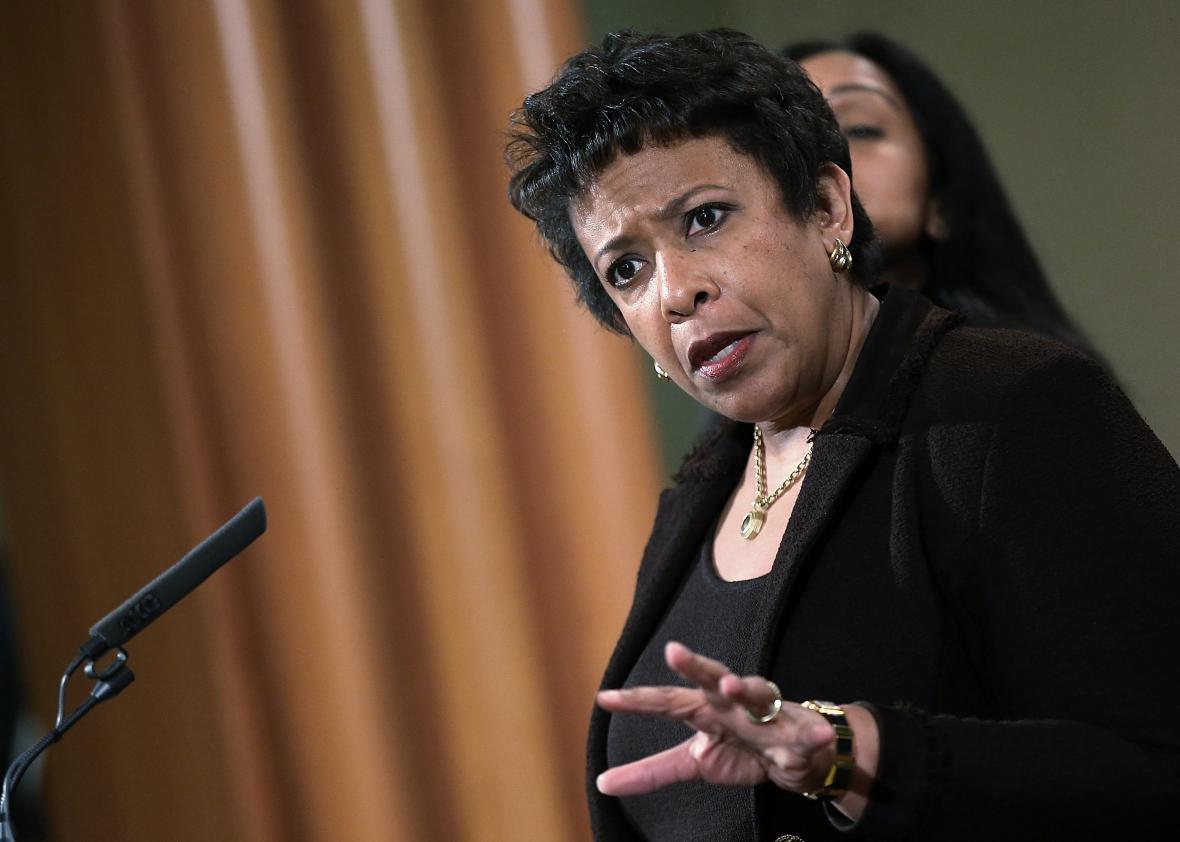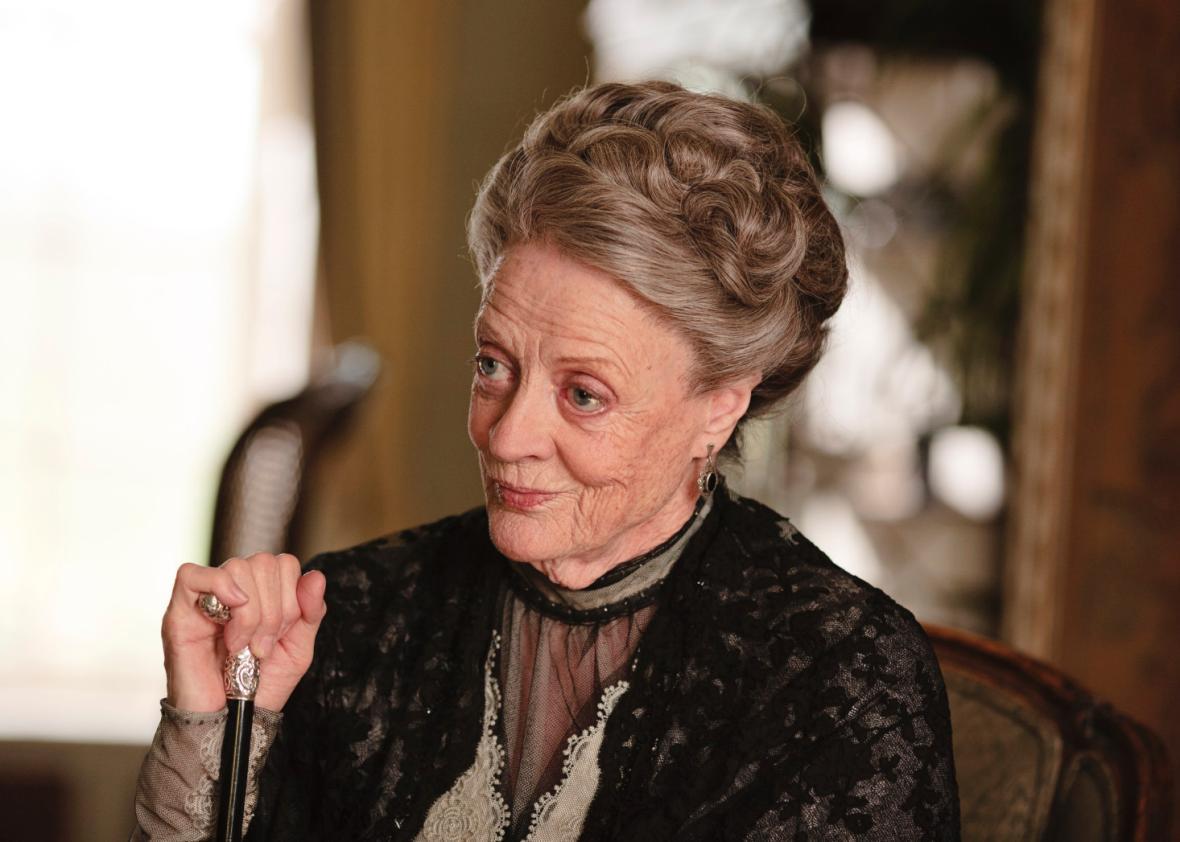We asked Outward contributors to name one queer thing (queer and thing defined broadly) that brought them joy in 2016, a trying year for the LGBTQ community and for America as a whole. Our hope is that, taken together, these flashes of deviant brilliance might strengthen us all for the year to come.
I’m obsessed with BenDeLaCreme’s new live show, Inferno A-Go-Go. A one-drag-queen retelling of Dante’s Inferno, it lures you in with kooky literary jokes; but through some stunning twists, it’s revealed to be an incisive, sophisticated, and darkly funny exploration of Hell itself—not just the place, but the concepts of cruelty, punishment, and suffering. I often recommend drag shows because they’re inventive, or surprising, or hilarious, or heartfelt. Inferno A-Go-Go is the first one I’ve recommended for being all those things—and also important.—Matt Baume, writer (Baume’s podcast, The Sewers of Paris, gathers even more recommendations from gay podcasters on a year-in-review episode that appears on Dec. 29, 2016, at SewersOfParis.com.)
I’ve never been a huge camper, but this fall, I went to an all-women’s festival in Palm Desert called Mothership. While not explicitly queer, it was one of the queerest things I’ve ever participated in, and that’ s saying a lot, considering I am both a personal and professional lesbian. Founded and run by lesbians (and with an open-door policy for any person who identifies partly or wholly as a woman), Mothership had vulva-driving workshops, feminist stick and poke tattoos, campfire singalongs, and let’s just say that any “straight” girl I met there ended up going home queerer than she arrived.—Trish Bendix, editor-in-chief, Go!
I’ m going to go ahead and say radical queer Twitter brought me joy in 2016. Moving into 2017, I neither want to ignore the world’s problems nor approach them with jaded nihilism. These journalists, organizers, and wayward hot messes like myself kept me informed, but they also made me laugh, also gave me hope, also reminded me that there are some seriously brilliant minds out there hard at work on the challenges that lie ahead. And in that, I found comfort. —John Paul Brammer, writer
Taylor Mac, a gender-fluid performance artist who uses the pronoun judy, reaffirmed the necessity of seeking queer implications in not exactly intuitive swaths of pop culture. Mac performed 24 decades’ worth of popular music, first in three-hour chunks, then as a 24-hour marathon, in Brooklyn this fall. Mac and judy’s band played “Born to Run,” with its defiant outcast protagonists, as illustration and punctuation of a chat judy gave about queer resistance in the Stonewall era. Mac sang the homophobic Ted Nugent song “Snakeskin Cowboys,” and commanded the audience to dance with a partner of the same gender, lest the Nuge win. Just about everybody danced. Mac showed that pop music history is a text for understanding how we got to our current nightmare, and how, as queers and Americans, we might just survive.—Andrea Majanik Bowen, writer

Alex Wong/Getty Images
I’ve watched Ellen DeGeneres accept her Presidential Medal of Freedom about 10 times in the last month. Since the election, conversations with queer friends have invariably turned, time and again, to fears for our futures and disillusionment with a seemingly imagined narrative of American progress. For a small, hopeful reminder of the triumphs we’ve witnessed in the past two decades, I show them the November 2016 video of Barack Obama recounting DeGeneres’ brave coming-out in an industry that all but shunned her for years. Remembering that America’s best-loved talk-show host—an unapologetic, androgynous dyke!—once shocked the nation by saying “I’m gay” fills me with gratitude. I am thankful that kind, cheerful, palatable lesbians like DeGeneres have made it easier for weirdo queers like me to travel safely through communities that have now already seen a real-life lesbian on their teevee screens. Watching her swallow her tears through a well-deserved tribute brings me great joy and a reliable tear or two of my own—happy ones, for a change.—Christina Cauterucci, Slate staff writer
I couldn’t eat just one queer thing from 2016: 1) The B-52s Halloween Show. These kooks seem oblivious to age, but not in a sad, Stones way. When Cindy Wilson took the stage dressed as an angel, I ascended with her. And Fred Schneider’s furious tossing of a drumstick at a video-obsessed fan was Angry Inch-worthy. 2) Shakespeare. In 2016, I needed his subversiveness more than ever. Whether it was the murderous Richard III played with a campy deliciousness, the quadruple gender-flip of Twelfth Night (a man playing a woman dressed as a man pretending to be a woman), or the no-holds-barred Achilles/Patroclus sexuality of Troilus and Cressida, the playwright is always right on time. 3. The post-Orlando massacre vigil in Philadelphia. Queer solidarity never felt so dangerous, or so vital.—John Culhane, “Hey, Daddy!” columnist

Amazon
The lifting of the military’s ban on transgender troops on June 30 came at the mid-point of a year of unthinkable highs and lows not just for LGBTQ Americans but for the country as a whole. The ban’s end marked a clear win in the fight for full equality. But it was also a triumph of facts over fears, given the military’s nefarious history of conducting and then ignoring and even burying research on sexuality and gender expression in the armed forces. As the world contends with the latest threats to the very notion that policy should rest on facts, this alignment of queerness and truth offered a bright spot of joy. We can only hope it’s not the kind that fades in an instant.—Nathaniel Frank, writer
There is something especially stimulating about a captivating debut novel. Garth Greenwell’s What Belongs To You finds beauty in the grime of the Eastern European gay underworld and a fresh voice with which to talk about feelings of guilt and shame, love and repression. Greenwell’s prose can be thick, relentless, and smothering even, but it is also written with a poetic ear for rhythm and phrase. At times, it sings in a way that makes What Belongs To You stand out among the year’s literary debuts.—Liam Hoare, writer

David McNew/Getty Images
I became aware of Ms. Darcel’s Facebook Live streams under less than ideal circumstances. It was mid-June, and I was down in Orlando to report on queer grief in the aftermath of the massacre at Pulse. While there, I learned that Darcel, a pageant-style drag queen and entertainment organizer at the Parliament House gay resort, was something of a mother figure in the local community. She’d recently started streaming her de-dragging process and chatting with fans in the wee hours—and it just so happened she was doing so when the shootings began across town. Watching her react to the news in real time (streams are stored on a user’s profile) was harrowing and powerful, but it was the way she’s used the platform in the days, weeks, and now months that followed that has kept me watching. Through these incredibly intimate, delightful videos, it’s become clear to me that though Ms. Darcel is a drag queen at a seedy gay bar, she’s also—like many queer artists before her—an activist, a community organizer, a social critic, and a role model for hundreds of queens and queers in Orlando and beyond. She was a bright spot in the middle of arguably the darkest moment of 2016 for our people, and for that, she’ll always get a <3 from me.—J. Bryan Lowder, Outward editor
For 24 hours in October, I was able to fully forget this trash fire of a year while listening to Taylor Mac (plus a hundred or so musicians, dancers, and guest stars) retell American history through hit songs. A 24-Decade History of Popular Music is one of the most ambitious queer theater projects I’ve ever seen, in terms of both scope (over the course of 24 hours, every decade since 1776 was addressed, using songs popular from that time) and vision (the entire project was also a metaphor for the community created via the devastation of the AIDS crisis). What really blew my mind, though, was the community that Mac created through the piece itself—I’ve never gotten to know other audience members so deeply.—Hugh Ryan, writer
On May 9, Attorney General Loretta Lynch walked up to a podium at the Department of Justice and astonished the world. Lynch’s remarks were billed as a brief overview of the DOJ’s lawsuit against HB2, a North Carolina law that, most notoriously, mandated discrimination against transgender people. But Lynch did so much more than that. She delivered a gorgeous, deeply moving plea for trans tolerance—and a robust defense of trans rights, comparing the push for transgender equality to great civil rights struggles of the 20th century. Toward the end of her speech, Lynch looked into the camera and spoke to transgender people across America. “We see you; we stand with you; and we will do everything we can to protect you going forward,” Lynch said. How many young trans lives did Lynch save in that moment?—Mark Joseph Stern, Slate staff writer

Win McNamee/Getty Images
This year saw major steps toward recognizing and teaching the queer past as part of American history. President Barack Obama designated the Stonewall Inn as a national monument; the National Park Service released a deeply researched 1,200-page study documenting additional LGBTQ historic sites nationwide. And in July, the California Board of Education unanimously adopted LGBTQ-inclusive history and social science curricular standards, with age-appropriate content spanning from second grade through high school. Now, students in the most populous state will learn how gender and sexual diversity shaped four centuries in what’s now the United States. Educators will now work to implement the standards and update textbooks—during a presidency when new progress will likely have to come at the state and local levels.—Timothy Stewart-Winter, LGBTQ historian
She survived a world war, a bout of flu, and countless afternoons with Isobel Crawley. In the end the Dowager Countess of Grantham survived the plot machinations of Julian Fellowes, too. As the series finale of Downton Abbey drew nigh, I grew afraid one of the final story twists would be her demise, and I was delighted to have been wrong. (If you think my adoration of Maggie Smith uttering acidic put-downs while wearing fabulous hats isn’t deeply gay, I defy you to say what is.) Come what may, the woman who inspires me to treat every adversity as an invitation to sarcasm is still sipping tea in a drawing room somewhere, and criticizing it.—Daniel Summers, “The Doctor Is Out” columnist
2016 was the year in which viewers told the TV industrial complex they’d had enough of queer female characters being killed off. But some fans didn’t just cry and complain, they took the means of production into their own hands and made videos focusing on the love rather than its loss. My favorite is a fanvid for Brazil’s Felizes Para Sempre? in which the action rewinds to the moment just before a bullet struck Denise’s head. On YouTube, The 100‘s Lexa and Clarke, Last Tango in Halifax’s Caroline and Kate, and Felizes Para Sempre‘s Marília and Denise never stop giving each other meaningful looks, dancing, and trampolining.—June Thomas, Outward editor

Nick Briggs
Pantsuit Nation was the worst-kept secret on Facebook, a safe-harbor space spawned in October for Hillary Clinton devotees. It swelled to nearly 4 million members before its founder fielded accusations of self-promotion for securing a book deal to publish some posts. Before that—and arguably since—there have been magical moments for those across the LGBTQ expanse: trenchant missives featuring coming-out stories, same-sex weddings, and pictures of trans children. Heartbreak over President-elect Donald Trump is palpable among the readership. When the girlfriend of one woman’s goddaughter proposed in front of the family on Christmas, she described that moment, ahead of inauguration day, as being akin to “a safe, pastoral scene in a snow globe.”—Karen Iris Tucker, writer
In 2016 I was delighted to read Autostraddle‘s Poly Pocket, an ongoing series featuring interviews with queer women speaking about their many varieties of polyamorous relationships. It’s tough to find positive examples of nontraditional relationships in a culture that still sees heterosexual monogamous marriage as both a default and an aspirational standard, so this series by and for queer woman was an oasis of queerness and nonmonogamy for me and mine.—Evan Urquhart, writer